From the Serengeti to Lake Natron: Jeremy Hance
April 14, 2011
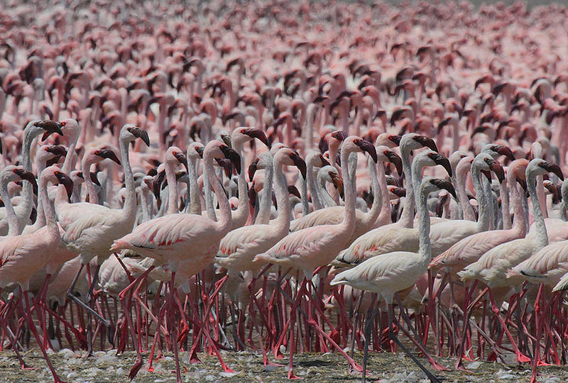
Thousands of lesser flamingos (Phoenicopterus minor) crowd in Lake Bogoria in Kenya. Nearly all of these flamingos will breed in Tanzania's Lake Natron, now a proposed site for soda ash mining. Photo by: Steve Garvie.
What's happening in Tanzania? This is a question making the rounds in conservation and environmental circles. Why is a nation that has so much invested in its wild lands and wild animals willing to pursue projects that appear destined not only to wreak havoc on the East African nation's world-famous wildlife and ecosystems, but to cripple its economically-important tourism industry? The most well known example is the proposed road bisecting Serengeti National Park, which scientists, conservationists, the UN, and foreign governments alike have condemned. But there are other concerns among conservationists, including the fast-tracking of soda ash mining in East Africa's most important breeding ground for millions of lesser flamingo, and the recent announcement to nullify an application for UNESCO Heritage Status for a portion of Tanzania's Eastern Arc Mountains, a threatened forest rich in species found no-where else. According to President Jakaya Kikwete, Tanzania is simply trying to provide for its poorest citizens (such as communities near the Serengeti and the Eastern Arc Mountains) while pursuing western-style industrial development.
"We have to develop to an industrialized country and to get there we should think through, plan and put strategies in place. Unlike other countries which are forced to import raw materials, our country has all the raw materials necessary for developing our industries," Kikwete said recently in response to the push to mine soda ash in Lake Natron.

Tanzania's 4th President, Jakaya Kikwete (centre), with US President Barack Obama and First Lady Michelle Obama. Photo by: US government.
But Kikwete's critics contend that he is trading Tanzania's most precious natural heritages—and some of the greatest wildlife spectacles on Earth—for an industrial slough that will enrich a few, mostly foreigners, but leave Tanzania, and its citizens, bereft.
"Kikwete's spiteful attitude towards the World Heritage site and his strange determination to drive a road through Serengeti make him look increasingly old-fashioned and vindictive," Andrew Dobson, Professor of Ecology and Evolutionary Biology at Princeton University, told mongabay.com. Dobson has conducted numerous studies in the Serengeti, including recent ones on the impact of the proposed roads.
There are reports that the Chinese are involved in Tanzania's plans, pushing the Serengeti road—and willing to fund it—in order to create a massive thoroughfare for mined minerals to be brought cheaply from the interior to the coast then shipped to China to continue its breakneck growth. But at this point these rumours are unsubstantiated, and the only ones who can answer such questions are those in the top levels of Tanzanian government.
In the end, the projects may be more about local politics than anything else. "The issue is complex and links closely to current national politics and the pressures the president is under from some elements within his own party, from a developing opposition, and from the national and international environment sector," a source working in conservation in Tanzania told mongabay.com. "Political promises have been made about roads, mining and hydroelectric power. Whilst there are very legitimate environmental concerns about all of them, and more economically viable alternatives have been found for the [Serengeti] road, a presidential U-turn may be considered by some as a sign of weakness. This makes an exit strategy complicated."
Flamingos and Soda Ash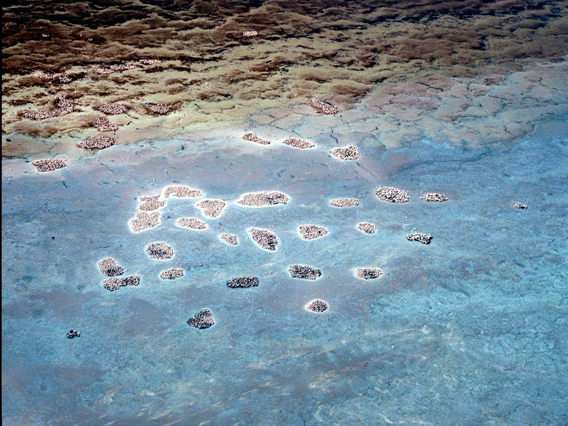
Aerial view of Lake Natron with flamingos (seen as tiny dots) nesting on islands. Photo courtesy of Neil Baker.
"There is no need for further delay, because experience shows that the excavation can continue without any disturbance to the eco-system there, environmental activists want people to believe that the move will wipe out the flamingo population, which is not true," Kikwete said.
To safeguard the two-and-a-half million flamingos that breed in Lake Natron, Kikwete is proposing to move the soda ash plant off-site, around 70 kilometres away in the town of Loliondo. According to the president, 300 million tons of soda ash would be moved from the lake via pipeline; the soda ash would not be mined by a local company, but by Tata Chemicals based in India.
Neil Baker, an expert on Tanzanian birds, told mongabay.com that Lake Natron is the 'only significant' breeding ground in East Africa. The lake provides a breeding space largely free of predators for millions of lesser flamingos.
Conservationists told the eTurboNews that even pipes would not save flamingos from disturbance. Massive construction and infrastructure on the lake would disturb the bird populations while the pipe would have to be moved constantly to take in the lake's chemicals.
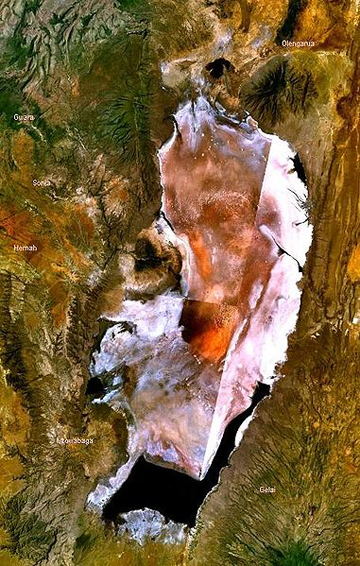
Lake Natron as viewed from satellites. Image by: NASA.
Declines in the lesser flamingo population would not only be an ecological loss, but also an economic one, as the birds are important to tourism in Tanzania and across East Africa.
According to Wolfgang Thome, eTurboNews correspondent for East Africa, the soda ash plant is actually linked to the Serengeti road. "The controversial Serengeti highway is clearly the main transportation link for those interests. As with the flamingo breeding grounds, so the migration of the great herds of wildebeest and zebras will have to make way for powerful industrial and financial interest groups in the good books of President Kikwete," writes Thome. However, President Kikwete says Tanzania must pursue industrial development: "we cannot continue to mourn about our country being poor while our minerals are lying untapped and with harvesting at Lake Natron, we will not be the first to do so, because our neighbours, Kenya, are doing the same on the other side of the lake," he adds referring to Magadi Soda Ash company in Kenya.
Lake Natron has been dubbed an international Ramsar wetland site, which means any changes undertaken at the lake, especially those that could impact the environment, should be communicated to Ramsar authorities.
Nullifying UNESCO Heritage Status for the Eastern Arc Mountains
Tanzania must not only take into account the Ramsar treaty, but must consider its relationship with the UN. After Tanzania's Serengeti road plans became public, the UN condemned them. It had the right to do so, since the Serengeti National Park is a UNESCO Heritage Site. Following the criticism the Tanzanian President announced he was planning on nullifying an application to add the Udzungwa and Uluguru Mountains as a UNESCO Heritage Site. Whether the decision is based on the conflict with the Serengeti is not known. What is known is that President Kikwete said the decision was because local people required the mountain habitat for economic reasons.
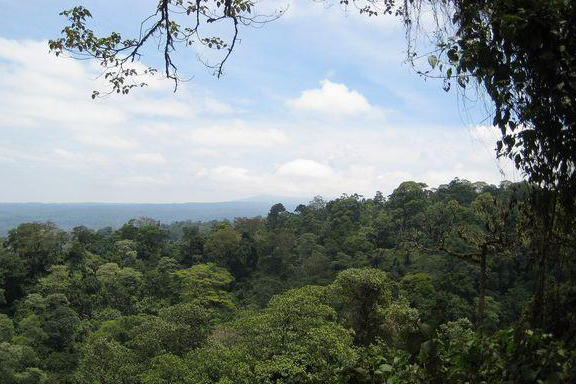
Tropical montane forest in Tanzania. Photo by: Rhett A. Butler.
"We cannot ask for UNESCO's permission in everything we do. There are things that we can decide ourselves," the president stated about the move.
There are four criteria for a nature site to make it on the UNESCO Heritage Site and a site need only meet one of the four. However, conservationist Katarzyna Nowak with Princeton University, says that the Udzungwa and Uluguru Mountains—a part of the Eastern Arc Mountains—meet all four criteria: an area of exceptional natural beauty, significant geologic importance, example of important evolutionary processes, or containing important endangered species or wild lands. Nowak should know as she has studied elephants in the Udzungwa Mountains.
Nowak explains that the biodiversity of the Eastern Arc Mountains helps make Tanzania the most bio diverse country in Africa, even beating countries in the Congo Basin. The Eastern Arc Mountains "are one of the most bio diverse sites in the world with large numbers of endemic and threatened genera and species," says Nowak, "around 3,500 plant species of which at least 450 species and 40 genera are endemic [found no-where else in the world], over 70 amphibian species of which 50 are endemic, over 50 reptile species with over 30 endemics, many of which are chameleons, over 120 bird species with over 21 endemic species and 2 endemic genera including the Udzungwa forest partridge and rufous-winged sunbird, and over 100 mammal species of which 12 are endemic."
Some special mammals in the region include three monkeys found no-where else in the world: Udzungwa red colobus (Procolobus gordonorum) and the Sanje mangabey (Cercocebus sanjei), both classified as Endangered by the IUCN Red List, and the kipunji (Rungwecebus kipunji), which is classified as Critically Endangered. The kipunji is especially bizarre as it was only discovered by researchers in 2003, making it the first new monkey to be discovered in Africa in 20 years. It is also the first new monkey genus in the world since 1923.
Then there was the discovery of the grey-faced sengi, or elephant shrew, in 2006, which just happens to be the largest elephant shrew in the world.
These forests were recently named number 10 in Conservation International's Top 10 Most Threatened Forest Hotspots, since only 11% of Africa's Eastern montane forests survive, and remnants are currently threatened by encroaching agriculture and bush meat hunting.
So, there is little question that the Eastern Arc Mountain site deserves Heritage status, but what about Kikwete's point that such status would only further impoverish local communities? "Is there evidence that UNESCO Heritage status has hurt local livelihoods (or kept out poachers for that matter?) in other heritage sites in Tanzania, such as the Selous Game Reserve or Serengeti National Park?," asks Nowak, "[…] Management decisions at the site-level (for example, the upcoming TANAPA-led ban on firewood collection by women in the Udzungwa Mountains National Park) will have more bearing on local communities and their attitudes toward the park than would Heritage Site status!" Andrew Dobson says that World Heritage Status would actually aid local communities economically.
"The increase in tourism […] may well have major benefits to people living in the vicinity. If World Heritage Status were conferred by UNESCO on these sites, it would further raise Tanzania status as one of the world's best examples of a country that appreciates its natural capitol," Dobson says, adding that "President Kikwete could reaffirm his status as one of Africa's most forward looking and progressive leaders. Someone who other African countries could look to as a role model and for leadership."
However, another conservationist, the source quoted earlier, said Kikwete could have good reasons to nullify the application. "Two of the country's main UNESCO World Heritage Sites, Serengeti and Selous are facing serious challenges in their management. And the Lake Natron Ramsar site also," the conservationist said. "Whether or not designation as a World Heritage Site has real value is a moot point. In this instance, it is understandable the president has shied away from it. He is already under considerable international pressure over the management of two World Heritage Site. Adding another one, in his eyes, merely sets him up for more negative press."
The Serengeti Road
That negative press, at least internationally, has much to do with the Serengeti road. Not surprisingly, neither Lake Natron nor the Eastern Arc Mountains has gained as much attention as the proposed road through Serengeti National Park. Home to the world's largest migration of land animals—two million wildebeest, antelope, and zebra migrate annually across this vast grassland—many view the Serengeti plains as one of the most important wildlife areas on Earth, and it is certainly among the most famous.
The Tanzanian government's plan would construct a road through the entirety of the northern end of the park. The government has said that a part of this road will remain unpaved and has given assurances that the road will not diminish the park's wildlife.
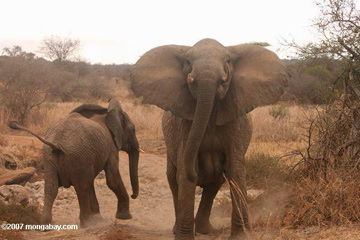
African savannah elephants in the Serengeti. Photo by: Rhett A. Butler.
"The Serengeti is a jewel of our nation as well as for the international community. […] We will do nothing to hurt the Serengeti and we would like the international community to know this," Kikwete recently said. However, scientists, and even government studies, disagree. According to them in time the road will effectively diminish, perhaps even destroy, the Serengeti migration. "The road is devastating as it will never remain a single road—it's presence will lead to increased traffic, DE gazetting of areas to either side of the road and thus increased poaching, increased collisions between wildlife and vehicles that will lead for calls for the road to be fenced. This will eventually stop the migration and the wildebeest and zebra populations will decline by 40 to 70%," explains Dobson who recently worked on a study looking at how the road will impact the annual migration. "This will have significant impact on tourism, fire frequency will increase, and the Serengeti will flip from one of the world's most significant carbon sinks, into a source of carbon. This will completely nullify Tanzania's potential to benefit from future schemes for carbon credits."
A leaked study by the Tanzanian government essentially agrees with Dobson's and many others' concerns. "The migration may be limited by the high level of traffic that will disrupt [it]. […] This is a major concern that has caused a lot of publicity for the [Serengeti] road project," reads the study. "It is argued that only will the wildebeest be affected but the animals that prey on them will also be impacted if the migration is disrupted". In other words, not only will wildebeest, zebra, and antelope suffer from the road project, but the predators that depend on them: lions, leopard, hyenas, cheetahs, and Nile crocodiles will also face significant declines.
An alternative route has been identified that would circumvent the Serengeti around the south, preserving the ecosystem. While the alternative route would serve more Tanzanian communities than the Serengeti road, the Tanzanian government says it will not budge with Kikwete arguing that the southern route would not serve the communities in the northern Serengeti who require better transit options. Enter the World Bank and the German government: the World Bank has offered to fund the alternative route, while the German government has offered to build local community roads for the people of the northern Serengeti.
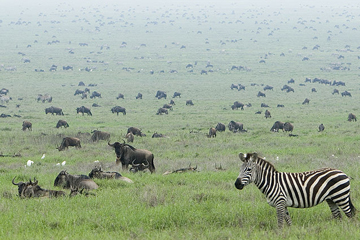 Zebra and wildebeest on the Serengeti. Photo by: David Dennis.
Zebra and wildebeest on the Serengeti. Photo by: David Dennis.
These propositions have added pressure on the Tanzanian government to change its plans, since the World Bank and the German government appear to addressed their concerns. Yet to date Kikwete and the Tanzanian government have not backed down, leaving many perplexed, including, says Dobson, local Tanzanians.
"Many people in Tanzania prefer the alternative plans and are proud of Tanzania's role as a leading country for conservation of large natural areas. They increasingly worry that President Kikwete is not behaving in away that reflect the values for which they voted for him to be elected as President. They are very concerned that people in government who might speak out, are remaining silent and worry they are being threatened. This is not a healthy direction for another African government to be taking."
Could Kikwete be afraid, as stated by a source earlier, that to change his mind now would be a sign of weakness? Yet, what leader would imperil his nation's greatest national park—both in terms of tourism and notoriety—simply to save a little face? In addition, if he did back down, even now, he would be praised effusively around the world.
Recently local opposition has been rising against the road in Tanzania. Last month The Tanzanian Association of Tour Operators (Tato) came out against the project. Tato, described as powerful local lobby group by the Tanzanian media, stated that the road would negatively impact tourism. Next a coalition of local NGOs working in wildlife, forestry, and fisheries dubbed MANET sent out a press release and statement stating that they too were against the Serengeti road.
"Ultimately it is essential that decisions about the road be made by Tanzanians," says Dobson, "but the government and media are responsible for ensuring everybody has the correct information on which to base this decision. The increasing local action against the road simply reflects more local Tanzanian people understanding the situation and expressing their concern that the government had previously misled them about the situation."
To what end?
No one should believe, even his critics, that Kikwete's job is easy or straightforward. He has to balance high expectations with on-the-ground realities, deal with recent problems such as rising commodity prices and energy shortages, and attempt to build infrastructure for a nation that still contains many hugely-impoverished communities. That's not all: Tanzania, like many East African nations, has faced terrible droughts in the past few years that have crippled its agriculture sector. It continues to battle an AIDS crisis and struggles to provide education to all its citizens. In conservation areas, Kikwete is facing a rash of poaching and serious management issues. Poaching has become so severe that he has recently announced the army will be sent in to some parks.
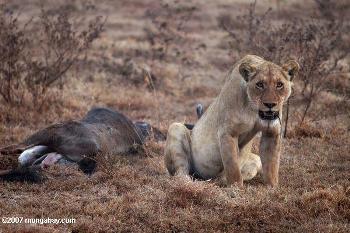
Female lion guards a wildebeest kill in Tanzania. A leaked government study warns that a proposed road project would hurt the Serengeti's big predator species. Photo by: Rhett A. Butler.
Katarzyna Nowak described Kikwete as "pro-development", and it's no secret he has been aggressively pushing for a massive expansion in mining and drilling by foreign companies. In his eyes, exploiting these resources could be a game-changer for Tanzania. However, in the eyes of critics he is imperilling Tanzania's world-renowned ecosystems by playing risky games with companies. Such deals could result in a 'resource-curse', whereby Tanzania loses much of its natural resources with little enrichment to its people. This is a story that has played out a number of times in Africa and elsewhere: natural resources are sold off, a few made wealthy, but the environment is wasted and the people who depend on it are left more impoverished than ever.
Whatever the outcome of these local and international debates, one has to wonder about the future of ecosystems worldwide if the Serengeti, in the very least, cannot remain protected. As populations grow worldwide and natural resources become scarcer or—in many cases—simply contaminated, as humans demand more and more (often for less): what protected area will actually stay protected? If a road, which scientists say will be devastating, can make its way through the iconic and world-famous Serengeti National Park home to elephants and lions, what chance will Virachey National Park in Cambodia have against rubber plantations or Yasuni National Park in Ecuador against further oil drilling?
Against the tide of humanity, against the cries for industrial-style development and consumption, its likely nature will continue to fall-back.
But we must ask ourselves: will we be the richer or the poorer for it?

No comments:
Post a Comment